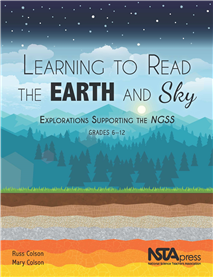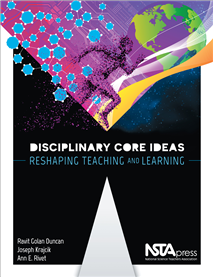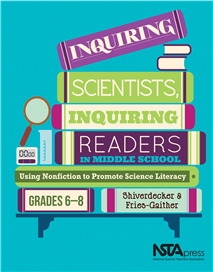All Book Chapters
Book Chapter
Learning to Read the Earth and Sky: Explorations Supporting the NGSS, Grades 6–12 (Book Sample)
Is it time to refresh the way you think about teaching Earth science? Learning to Read the Earth and Sky is the multifaceted resource you need to bring authentic science—and enthusiasm—into your classroom. It offers inspiration for reaching beyon...
Book Chapter
Introduction to DCIs: What They Are and Why They Are Important
This chapter serves as an introduction to Disciplinary Core Ideas (DCIs). As a whole, DCIs help students build usable knowledge that is central to the physical sciences but also across the life sciences, Earth and space sciences, and engineering. The...
Book Chapter
Core Idea PS1: Matter and Its Interactions
This chapter focuses on matter and its interactions and discusses the importance of how a rich understanding of atomic theory leads to a deeper understanding of why there are so many different substances in the world. A full understanding of matter a...
Book Chapter
Core Idea PS2: Motion and Stability: Forces and Interactions
This chapter discusses the disciplinary core idea of forces and interactions which consists of three component ideas that are described here. If any idea is a core concept, it is the idea of forces and interactions. Forces affect every single thing i...
Book Chapter
This chapter focuses on energy—perhaps the most important idea in all of science. It is used by every scientific discipline and applies to all known natural phenomena. Students hear and use the word “energy” from a very early age, but developin...
Book Chapter
Core Idea LS1: From Molecules to Organisms: Structures and Processes
In this chapter, the disciplinary core idea (DCI) is central to biology and also serves as the glue connecting all four DCIs in the life sciences strand. In essence, it is about the properties of living things and explaining the complexity of life an...
Book Chapter
Core Idea LS2: Ecosystems: Interactions, Energy, and Dynamics
This chapter begins by suggesting three ways in which a deeper understanding of ecosystems could enrich students’ lives and support their participation as informed citizens in society. The three ways are by: developing a deeper appreciation of the ...
Book Chapter
Core Idea LS3: Heredity: Inheritance and Variation of Traits
The heredity disciplinary core idea (DCI) is about the biological mechanisms that underlie many familiar and less familiar phenomena such as genetic disorders, genetically modified foods, gene therapy, and others. Explaining how and why we are simila...
Book Chapter
Core Idea LS4: Biological Evolution: Unity and Diversity
This chapter has hopefully provided a bit more insight into the disciplinary core idea (DCI) of Evolution: Unity and Diversity. Taking an evolutionary perspective on biology is one of the most powerful ways that scientists make sense of and reason ab...
Book Chapter
Core Idea ESS1: Earth’s Place in the Universe
Earth and space sciences consists of three disciplinary core ideas (DCIs) that help to explain a wide variety of Earth-related phenomena, including the motion of the planets, changes in climate, and the shape of Earth structures. In this chapter, the...
Book Chapter
Core Idea ESS2: Earth’s Systems
The Earth exists as one large system, consisting of an array of interconnected subsystems. Often, scientists focus their efforts on exploring and explaining smaller, individual subsystems or even smaller relationships within these subsystems. However...
Book Chapter
Core Idea ESS3: Earth and Human Activity
Of all the fields of scientific study, the Earth sciences are one of the most interdisciplinary. This is particularly true for this disciplinary core idea (DCI), which focuses on society’s interactions with the planet’s complex systems. Today, Ea...
Book Chapter
Core Idea ETS1: Engineering Design
The engineering, technology, and applications of science disciplinary core ideas (DCIs) address questions about the ways in which engineers use science to develop solutions, the process of design, and the effects of our designed world on nature and, ...
Book Chapter
Core Idea ETS2: Links Among Engineering, Technology, Science, and Society
This component of the disciplinary core idea (DCI) brings together two movements in science education—environmental education and science, technology and society. Learning about the Influence of engineering, technology, and science on society and t...
Book Chapter
This lesson helps students understand the function of the nucleus, cell membrane, cell wall, mitochondria, and chloroplasts. Students will relate the structure of each organelle to its function, develop and use a model to explain the functions of org...




